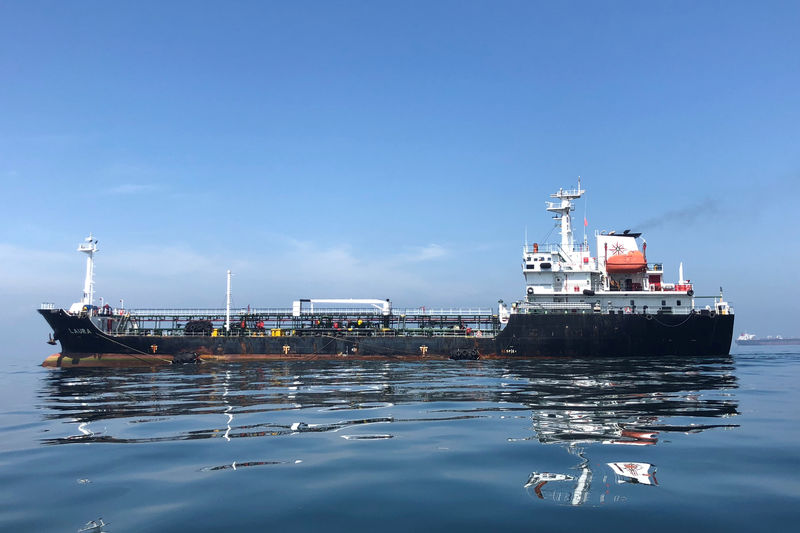By Devika Krishna Kumar and Stephanie Kelly
(Reuters) - Venezuela's revenues from oil sales to the United States have come under severe threat as sweeping sanctions on Venezuelan state-owned oil firm has sent U.S. buyers scrambling for replacements.
The United States on Monday imposed sanctions on Petróleos de Venezuela, S.A., known as PDVSA, to cripple the OPEC member's oil shipments, which account for nearly all of Venezuela's exports, in response to the reelection of socialist President Nicolas Maduro, a vote widely viewed as fraudulent.
Washington has recognized opposition leader Juan Guaido as Venezuela's head of state.
U.S. refineries that depend on Venezuela's heavy crude are turning to domestic sour crude grades to offset the impact, sending prices to the strongest in about five years, traders said. Other potential alternatives from Canada, Mexico or elsewhere in Latin America are hard to secure amid slowing production, limited spare capacity and transportation bottlenecks, traders said.
Broader oil futures prices found some support on news of sanctions but the market reaction was largely muted as a lack of investment, mismanagement and fleeing workers have already driven the OPEC-member's oil production to the lowest in almost seven decades.
PDVSA is seeking to sidestep Trump administration sanctions restricting payments for its oil by asking major buyers, including U.S. refiners, to renegotiate contracts, four sources involved in the talks said.
The United States is Venezuela's biggest oil customer, importing, on average, about 500,000 barrels per day (bpd) of crude in 2018, according to Refinitiv Eikon data.
"The region with the biggest shortfall of Venezuelan crudes, either through sanctions or inadvertently through further production declines is the U.S.," said Michael Tran, commodity strategist at RBC Capital Markets, in a note.
For an interactive graphic on top importers of Venezuelan crude, see: https://tmsnrt.rs/2RYGk2E.
WHERE WILL VENEZUELA'S OIL GO?
The Trump administration sanctions allow U.S. companies to buy Venezuelan oil, but the proceeds of such sales will be put in a "blocked account."
Because of this, PDVSA is likely to quickly stop shipping much crude to the United States, its top client. Overnight, Maduro said cargoes loaded for the United States that had not already been paid for could not depart.
"There's going to be appetite around the world to take Venezuelan oil," Zachary Rogers, an oil markets analyst at consultancy Wood Mackenzie said.
Venezuela will likely be forced to offer steep discounts and increase shipments to Russia, China and India to try and make up for lost revenues from its top market, traders and analysts said.
Its output has been cut in half since 2016 to near 70-year lows to less than 1.2 million bpd, according to figures from OPEC secondary sources, due to a major cash crunch.
As a result, the U.S. share of its exports has declined in recent years, with more shipments going to Russia and China made largely through oil-for-debt repayment structures.
Venezuela can prioritize exports to Asia, but it is the most competitive battleground on the planet, RBC Capital's Tran said, adding that while they remain the second largest market for Venezuelan crudes, the Chinese have also tapered its buying from Caracas over the past two years.
For an interactive graphic on Venezuelan crude exports to the United States, see: https://tmsnrt.rs/2S4YIXB.
HOW WILL THE U.S. REPLACE VENEZUELAN OIL?
Shipments to the United States account for about 75 percent of the cash Venezuela gets for crude shipments, according to a Barclays (LON:BARC) research note published earlier this month.
Citgo Petroleum, the U.S. refining arm of PDVSA and the biggest importer of Venezuelan crude, did not reply to a request for comment. The other primary importers Valero Energy Corp (NYSE:VLO) and Chevron Corp (NYSE:CVX) said they will comply with U.S. laws.
Though the United States is the top oil producer with output of nearly 12 million bpd, complex Gulf Coast refineries need heavier crude grades to produce diesel and other high-margin products, and cannot simply substitute it with light crude.
The easiest substitute for now is domestic sour grades. Prices of heavier U.S. grades like Mars Sour, an offshore medium U.S. crude, and West Texas Sour crude
On Tuesday, Mars crude traded at about $6 a barrel premium to the U.S. crude futures benchmark, up from a $5.20 a barrel premium on Monday and remained near a five-year high, traders said, while West Texas Sour was near the strongest level in a year.
"It's nuts. Everything with sulfur in it is getting bid," said one U.S. crude trader said, referring to crude's sulfur content that is known in the market as "sour grades."
Some traders said much of the impact had already been priced in.
"I actually think it may end up being bearish medium to longer term ... If Guaido takes power and foreign investment flows into Venezuela, then their production has a lot of room to go back up over time," a trader at a merchant said.
Currently, alternatives to Venezuela's heavy sour crudes are becoming increasingly scarce in the Americas, due to challenges facing heavy crude producers Canada and Mexico.
Canada produces more than 4 million bpd, much of it heavy crude that could replace Venezuelan grades, but pipeline bottlenecks are hampering its exports.
"Until the ongoing (Canadian) pipeline issues are addressed, crude by rail is simply not as scalable as increased shipments from Mexico or Iraq," said Tran.
However, Mexico's crude output levels are among the lowest on record dating back several decades as its top-producing fields have aged, and new ones to replace them have not been developed.
The Trump administration is considering tapping the country's emergency reserve of crude as it imposed sanctions on PDVSA, but no decision has been made, a U.S. government source said. The reserve currently holds 649.1 million barrels of crude, about 396 million of which is classified as sour oil.
For an interactive graphic on Venezuelan crude exports to U.S. refiners, see: https://tmsnrt.rs/2S42EI5.
For an interactive graphic on top crude importers to the U.S. Gulf Coast, see: https://tmsnrt.rs/2HElW2U.
